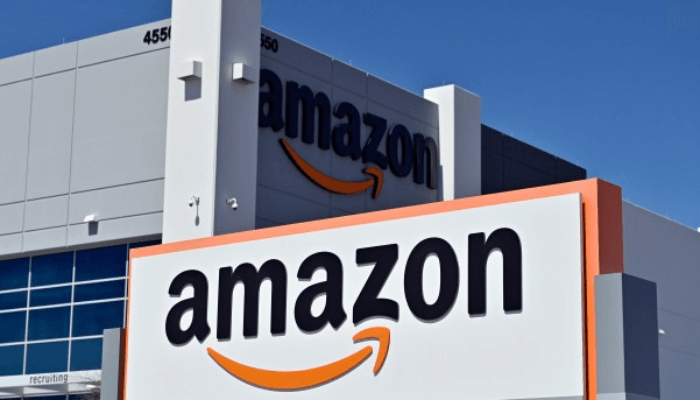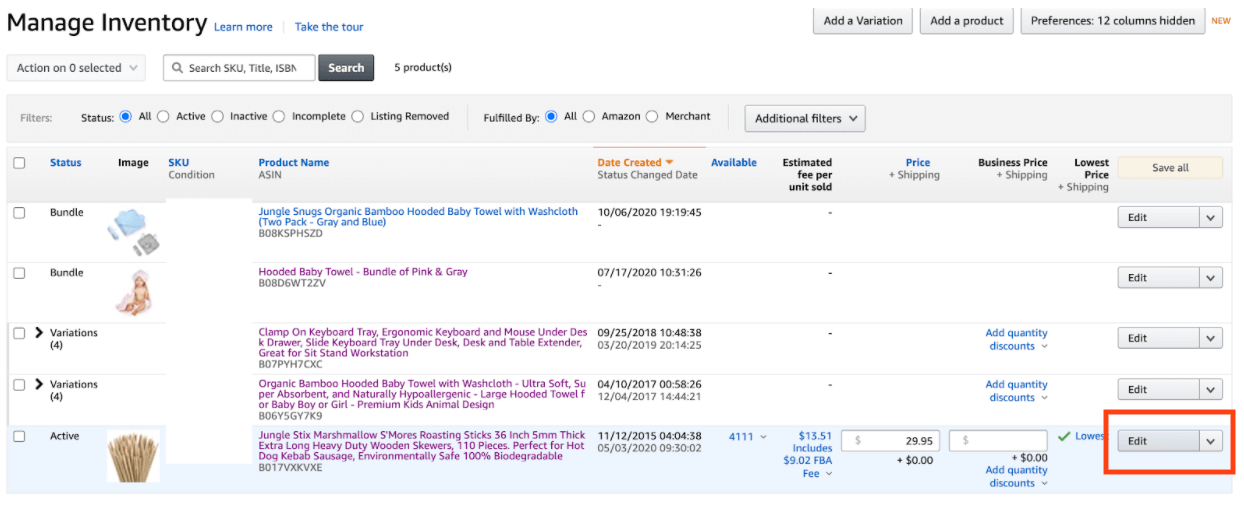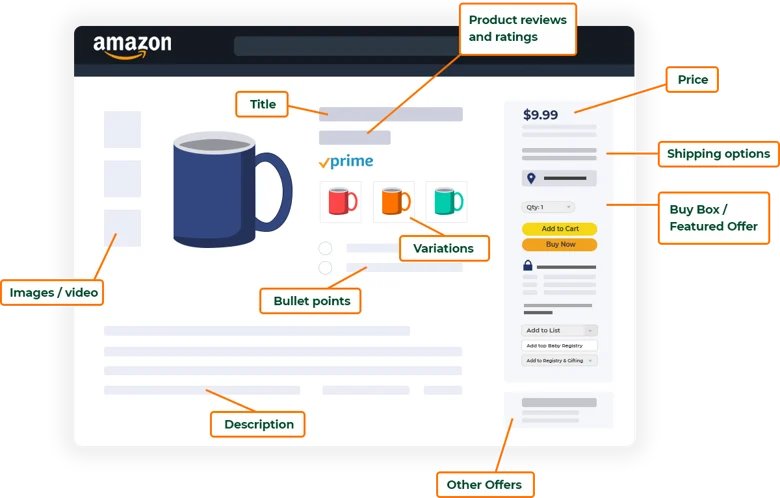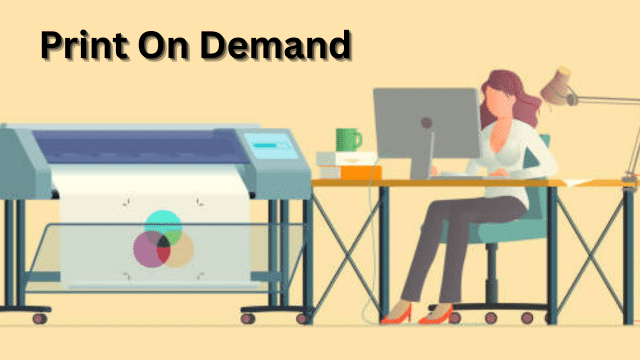Imagine waking up to a notification on your phone that says you just made money while sleeping. Not from a 9-5 job or a side hustle that drains your energy, but from selling your product on Amazon, the world’s largest online marketplace. That’s the beauty of tapping into a global business right from your home in Nigeria.
Selling on Amazon from Nigeria might seem like something only tech experts or big companies can do. But the truth is, more Nigerians are learning how to break into this multi-billion-dollar opportunity, without leaving the country. With the right tools, knowledge, and strategy, you too can become one of them and also make money from it.
In this guide, you’ll discover exactly how to start selling on Amazon from Nigeria, step by step, using beginner-friendly methods that work in 2025.

Why You Should Consider Selling on Amazon
Selling on Amazon offers several powerful advantages:
1. Access to a global market: You’re not just limited to selling in Nigeria. Your products can reach millions of buyers in the U.S., UK, and beyond.
2. Earn in dollars: With the naira’s unpredictable value, dollar income is a game-changer.
3. No need to build a website: Amazon already has the traffic, tools, and trust you need.
4. Passive income potential: With Fulfillment by Amazon (FBA), Amazon stores, packs, and ships your products, even while you sleep.
Whether you’re a student, a business owner, or someone looking to earn extra income, Amazon gives you a scalable way to build wealth online.
Is It Possible to Sell on Amazon from Nigeria?
Yes, it’s 100% possible. While Amazon doesn’t officially list Nigeria as a “supported country” for direct seller registration, thousands of Nigerians are selling legally and successfully through simple workarounds. You’ll need tools like Payoneer to receive payments and freight forwarders to handle shipping, but the entire process is both legal and achievable.
So don’t let your location limit your dreams. You can build an Amazon business from Nigeria, just like sellers from the U.S. or the UK.
Related Posts:
What You Need to Get Started
To start selling on Amazon from Nigeria in 2025, here’s what you need:
1. Nigerian International Passport: For identity verification.
2. Utility bill or bank statement: To confirm your address.
3. Payoneer account: To receive Amazon payments in USD.
4. Laptop or smartphone + reliable internet: For account access and business management.
5. Startup capital: At least ₦200,000 to ₦1.5 million (depending on your product and fulfillment model).
Step-by-Step Guide: How to Start Selling on Amazon from Nigeria
Step 1: Create and Verify Your Account
Since Amazon doesn’t directly support Nigerian bank accounts for payouts, you’ll need a Payoneer account to receive your earnings. Payoneer acts like a virtual U.S. bank account and allows you to withdraw your Amazon income into your Nigerian bank account in naira.
Here’s how to set it up:
1. Visit www.payoneer.com and click on “Sign Up”.
2. Choose “Freelancer” or “Online Seller” as your account type.
3. Fill in your real name exactly as it appears on your ID (passport), your home address, Nigerian phone number, and email.

When asked for your bank details, provide a Nigerian bank account for withdrawals (Payoneer converts your dollar payments to naira at market rates).
5. Upload your valid Nigerian international passport or government-issued ID, and a recent utility bill or bank statement that matches your address.
6. Submit and wait for approval. This can take anywhere from a few hours to 2–3 business days.
Once your account is approved, Payoneer will give you U.S. virtual bank account details, which you’ll later add to your Amazon Seller account so you can receive payments from Amazon directly into your Payoneer account.
Step 2: Set Up Your Amazon Seller Account (Professional or Individual)
Now that your Payoneer account is ready, the next step is to create your Amazon Seller Central account. This is where you’ll manage your entire business, from product listings to sales, inventory, payments, and customer service.

To get started:
1. Go to https://sell.amazon.com and click on “Sign Up”.
2. Choose your account type:
Individual Seller: No monthly fee, but you’ll pay $0.99 per sale. Good for testing the waters.
Professional Seller: $39.99/month flat fee. Ideal if you plan to sell more than 40 items/month or run it as a full business.
3. Provide your full legal name (as it appears on your passport).
4. Fill in your business location (Nigeria), address, and phone number.
5. Upload your Nigerian international passport and bank statement or utility bill for verification.
When prompted to enter your bank account, use the U.S. account details from Payoneer.
6. Complete the tax interview (don’t worry, it’s a short online form that asks if you’re a U.S. citizen; select “No”).
7. After submission, Amazon will conduct a video call verification (usually with an Amazon rep asking you to show your ID and documents). Make sure you’re in a well-lit room with your original documents handy.
Step 3: Choose a Profitable Product to Sell (The Right Product Makes All the Difference)
One of the most important decisions you’ll make as an Amazon seller is what product to sell. Choosing the right product can determine whether your business thrives or struggles. Don’t just pick random items, your product needs to meet certain criteria to succeed on Amazon, especially as a beginner in Nigeria.
Here’s what to consider when choosing a product:
Qualities of a Good Beginner Product:
- Lightweight (easier and cheaper to ship)
- Small in size (fits into a standard Amazon package)
- Not fragile (less chance of damage during shipping)
- Has high demand but low competition
- Sells for $15–$50 (good balance between affordability and profit)
- Not seasonal (sells all year round)
Where to Get Product Ideas:
1. Amazon Best Sellers: Visit https://www.amazon.com/Best-Sellers to see top-selling items across various categories.
2. YouTube/Blogs: Watch videos of successful Amazon sellers sharing trending product ideas.
3. Google Trends: Search for your product idea and check if it’s gaining popularity.
4. Product Research Tools: Use free or trial versions of tools like:
- Jungle Scout
- Helium 10
- AMZScout
Don’t rush this step. Spend time researching 2–3 good product ideas and compare them using factors like price, competition, and demand.
Step 4: Find a Trusted Supplier for Your Product (Even from Nigeria)
Once you’ve identified a promising product, the next step is to find a reliable supplier who can provide that product at a cost low enough for you to make a profit.
The most common platform for sourcing products is Alibaba.com, a global marketplace where manufacturers (mostly in China) sell products in bulk.
How to Use Alibaba to Find a Supplier:
1. Go to www.alibaba.com and type in your product idea.
2. Filter your search by selecting:
- Trade Assurance (protects your payment)
- Verified Supplier (adds credibility)
- Ready to Ship (faster delivery)
3. Contact 3 – 5 suppliers and ask:
What’s the minimum order quantity (MOQ)?
- Can they brand the product with your logo (private label)?
- Do they have experience shipping to Amazon warehouses?
- What’s the cost per unit, including shipping?
Not Sure What to Ask? Here’s a Sample Message to use as an example:
“Hi, I’m a seller from Nigeria interested in [Product Name]. I would like to know the MOQ, unit price, shipping time, and whether you can ship directly to an Amazon FBA warehouse in the USA. Please also share photos, packaging options, and your company’s catalog. Thank you!”
Take time to compare responses, prices, and shipping options. Many suppliers are open to negotiations, especially if you’re ordering in bulk.
Step 5: Choose Your Fulfillment Method
When it’s time to deliver your product to customers, Amazon gives you two main options: FBA (Fulfillment by Amazon) and FBM (Fulfillment by Merchant). The one you choose will affect how your business runs day to day.
With FBA, you send your products in bulk to Amazon’s warehouse in the U.S. From there, Amazon takes care of everything, including packaging, shipping, returns, and even customer service.
This method is very popular with sellers who live outside the U.S., like in Nigeria, because it saves time, energy, and the hassle of managing international deliveries yourself.
On the other hand, FBM means you handle the storage, packaging, and shipping of each order. You’re also responsible for customer support. While this might work for sellers living in the U.S. or those with their own logistics setup, it’s often stressful and expensive for sellers in Nigeria.

That’s why FBA is the better choice for beginners in Nigeria. It allows you to focus on growing your business while Amazon handles the heavy lifting. Your only job is to make sure your supplier ships the products correctly to Amazon’s warehouse, and then you’re good to go.
Step 6: List Your Product on Amazon and Optimize It for Sales
Now that your inventory is headed to Amazon, it’s time to list your product on the marketplace and make it attractive to buyers. This is your online shop window, so you want it to look as professional and convincing as possible.
To list your product, go to your Amazon Seller dashboard and click “Add a Product.” If your product already exists on Amazon (like a phone case or water bottle), you can list under the existing ASIN. If it’s a unique or branded product, you’ll need to create a new listing from scratch.
Here’s what your product listing should include:
1. Use a catchy title with the main keyword.
2. High-quality images (you can ask your supplier for clear, professional photos or hire someone on Fiverr to design them).
3. A detailed product description that explains what the product does, its benefits, and who it’s for.
4. Bullet points that highlight key features, like material, size, weight, or use cases.
5. A competitive price that’s similar to or slightly lower than other sellers.
6. Also, make sure you use the right keywords in your title and description so people can find your product when they search. Tools like Helium 10 or Amazon’s suggestions can help you identify useful keywords to include.
Once your listing is live and your product reaches the warehouse, Amazon will automatically fulfill customer orders as they come in. You can monitor your sales, stock levels, and customer feedback all from your Seller dashboard.
Step 7: Ship Your Products to Amazon Warehouse
Once your products are ready, the next step is shipping them to Amazon’s fulfillment center. You’ll generate FBA shipping labels through your Amazon Seller account and share them with your supplier or freight forwarder. It’s important that the packaging meets Amazon’s guidelines to avoid any delays or issues upon arrival.
Note: For Nigerian sellers, using a freight forwarder like Shoptomydoor, Heroshe, or Aquantuo can simplify the process. They will help you manage the shipping, customs, and delivery to Amazon’s warehouse in the U.S.
Make sure to track your shipment carefully until it reaches Amazon, so you can confirm that everything is in place and ready for sale.

Step 8: Launch and Promote Your Product
With your product live on Amazon, the next task is to drive traffic and start generating sales. A great way to get noticed quickly is by running Amazon PPC (Pay-Per-Click) ads.
This boosts your product’s visibility by placing it in front of potential customers actively searching for related items. You can also offer discounts or coupons to encourage early buyers, helping you gain traction.
Another helpful tactic is to ask trusted friends or family abroad to buy your product and leave honest reviews. This builds your product’s credibility and improves its ranking on Amazon, making it more visible to other shoppers.
The estimated cost of selling on Amazon from Nigeria
Here’s an estimated breakdown of the costs you might incur when starting to sell on Amazon from Nigeria. These costs will vary based on your product type, the scale of your business, and the services you use.
| Item | Estimated Cost (₦NGN) |
|---|---|
| Amazon Seller Account | ₦50,000/month (or $39.99) |
| Product Inventory | ₦100,000–₦1,000,000 |
| Shipping/Freight | ₦80,000–₦300,000 |
| Advertising (PPC) | ₦50,000–₦200,000 |
| Product Photos/Graphics | ₦30,000+ |
Common Mistakes to Avoid
When starting, it’s easy to make mistakes that can cost you time, money, and effort. Here are some of the most common missteps Nigerian sellers should avoid:
1. Skipping product research: Always do thorough research on the product you’re planning to sell. Not understanding market demand or competition can lead to poor sales and wasted investment.
2. Selling in restricted categories: Some product categories on Amazon are restricted or require approval to sell in. Make sure you check Amazon’s list of restricted categories before listing your items to avoid unnecessary setbacks.
3. Using poor images or weak product descriptions: The first thing customers notice are your product images and descriptions. Low-quality images or vague descriptions can make your product look unprofessional and untrustworthy, resulting in fewer sales.
4. Ignoring Amazon’s policies or getting suspended: Amazon has strict rules regarding listings, shipping, and customer service. Not following these policies can get your account suspended, so make sure you understand and adhere to all of Amazon’s guidelines.
5. Starting without understanding the costs involved: It’s easy to underestimate the costs of selling on Amazon. Always factor in fees, shipping, advertising, and other expenses before you start. Proper budgeting is key to building a sustainable business.
Frequently Asked Questions and Answers
1. Can I make $1000 a month on Amazon?
Yes, it’s possible to make $1000 a month on Amazon, but it depends on several factors, including your product choice, pricing strategy, marketing efforts, and how well you manage your inventory.
Sellers who are consistent in promoting their products, optimizing their listings, and running Amazon ads tend to earn more. It’s essential to start small, learn the process, and scale up gradually. Your success will grow as you gain more experience and understand your market.
2. Does Amazon accept Nigerian Cards?
Currently, Amazon doesn’t directly accept Nigerian debit or credit cards for international transactions. However, Nigerian sellers can still set up an account by using an international payment method like Payoneer or Wise to receive payments from Amazon. For buying on Amazon, some Nigerians use virtual cards or services like Shoptomydoor or PayPal to facilitate purchases. Be sure to check Amazon’s payment policies to ensure smooth transactions and work.
3. Is Selling on Amazon Free?
No, selling on Amazon isn’t free. Amazon charges a monthly subscription fee, which is typically around ₦50,000 (or $39.99) for a professional seller account.
Additionally, there are other fees, such as referral fees (a percentage of your sales) and shipping costs. If you choose Fulfillment by Amazon (FBA), there will also be storage and handling fees. However, the tools and platform Amazon provides make it worthwhile for many sellers, especially those just starting.
4. Do Nigerians Shop on Amazon?
Yes, Nigerians do shop on Amazon! While local e-commerce platforms are more commonly used, many Nigerians buy products from Amazon for items that may not be available locally or because they’re looking for international brands.
Some even use Amazon to shop for books, electronics, and unique products that are hard to find in local stores. Many Nigerians also shop on Amazon by using international shipping services like Shoptomydoor to deliver items to Nigeria.
Conclusion
Selling on Amazon from Nigeria is no longer a mystery; it’s a proven path that many have already taken. You don’t need to be a tech wizard, and you don’t need millions to start. You just need to be ready to learn, stay consistent, and take that first step.
Start with research, take your time with setup, and don’t expect instant riches. But if you stick with it, Amazon can be the platform that changes your life and your bank balance.
So, are you ready to take that step? Your future Amazon success story might just be one product away.


